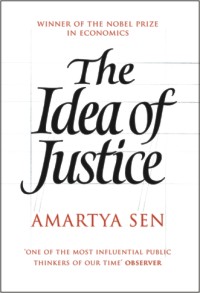Book Review
The Idea of
Justice
by
Amartya Sen
Steven Poole
 The eminent professor and Nobel laureate Amartya Sen has chosen for his deeply interesting synthesis of political philosophy, economics and "social choice theory" a title that might at first appear rather bland, but it is holding two opposing ideas in a kind of dynamic stasis. Half the implication is indeed that it is possible to spend too much time on justice-as-a-mere-idea. But the other half is an insistence that justice-the-idea could be re-engineered to work better as a basis for "practical reasoning", such that it might improve the world. The eminent professor and Nobel laureate Amartya Sen has chosen for his deeply interesting synthesis of political philosophy, economics and "social choice theory" a title that might at first appear rather bland, but it is holding two opposing ideas in a kind of dynamic stasis. Half the implication is indeed that it is possible to spend too much time on justice-as-a-mere-idea. But the other half is an insistence that justice-the-idea could be re-engineered to work better as a basis for "practical reasoning", such that it might improve the world.
For Schopenhauer, injustice was the analytically primary term: justice was merely the absence of injustice. (There seems to be a primordial sense of injustice: animal researchers have observed chimpanzees and capuchin monkeys showing a keen sense of when treats are distributedly unfairly.) Schopenhauer does not make an appearance in this book, but Sen's approach is arguably Schopenhauerian to this extent: "[A] theory of justice that can serve as the basis of practical reasoning," he writes, "must include ways of judging how to reduce injustice and advance justice, rather than aiming only at the characterisation of perfectly just societies."
This might seem obvious to some. Aid workers, lawyers, or humanitarian NGOs might understandably have little time for perfectionist justice-talk as they go about their business. Sen argues that philosophy could help, were it not that too much talk of justice in modern political philosophy has, by contrast, been concerned with interrogating an otherworldly ideal of the perfectly just society constructed ab ovo. His main target in this tradition is John Rawls, who published his monumental A Theory of Justice in 1975. Sen calls Rawls's method "transcendental institutionism", in contrast to his own "comparative"
approach.
Sen is exquisitely civilised in his disagreements with other thinkers, even while he is elegantly trashing whole schools of economic and social thought. He dismisses reliance on GDP as a measure of "the enhancement of inanimate objects of convenience"; and notes that the use of income as a comparative measure of wellbeing is flawed because there are differences in the rates at which people can convert wealth into other things. (This latter point is an example of his insistence that justice-thinking must take account of the lives people can actually lead, rather than the static bureaucratic situations in which they are placed.) Refreshingly, his terms of reference are not limited to western politics: he borrows an illuminating distinction from classical Indian thought, and demolishes the prejudice that democracy, if understood broadly as government by public reasoning, is an exclusively western tradition.
The very inclusiveness and generosity of Sen's thinking might invite criticism on the basis that his "capacious theory" is indeed so capacious, so concerned to be "open" rather than "closed", that there is nothing that could not, with a little tweaking, fit in it. The less a theory excludes, the more work is left up to the post-theoretical "practical reasoning". But Sen provides enough brilliant examples of such reasoning (with regard to famine, disability, disease and so on) that this comes to seem, on balance, a virtue. A second, tougher criticism might point to the apparent assumption throughout that the argument is essentially taking place between well-meaning liberals. He writes: "To argue that we do not really owe anything to others who are not in our neighbourhood, even though it would be very virtuous if we were to be kind and charitable to them, would make the limits of our obligations very narrow indeed." For Sen, that appears to suffice as a dismissal, on the grounds of implausibility, of such a view; yet it appears to be the principle behind Republican efforts to stymie universal healthcare in the US, or Conservative hopes to offload more social provision on to charities.
Perhaps, then, Sen's magisterial summation of his thought suffers from an excess of niceness; but this is surely preferable to its opposite. There is something quietly inspiring about his final chapter on the increasing reach and quality of "global reasoning", via institutions and less formal methods, which for him already constitute a kind of global democracy in embryo, and he ends on a delicately pitched note of calm optimism: "The general pursuit of justice might be hard to eradicate in human society." We can hope so.
This review was first published in the Gaurdian.
Copyright
(R) thedailystar.net 2009 |
